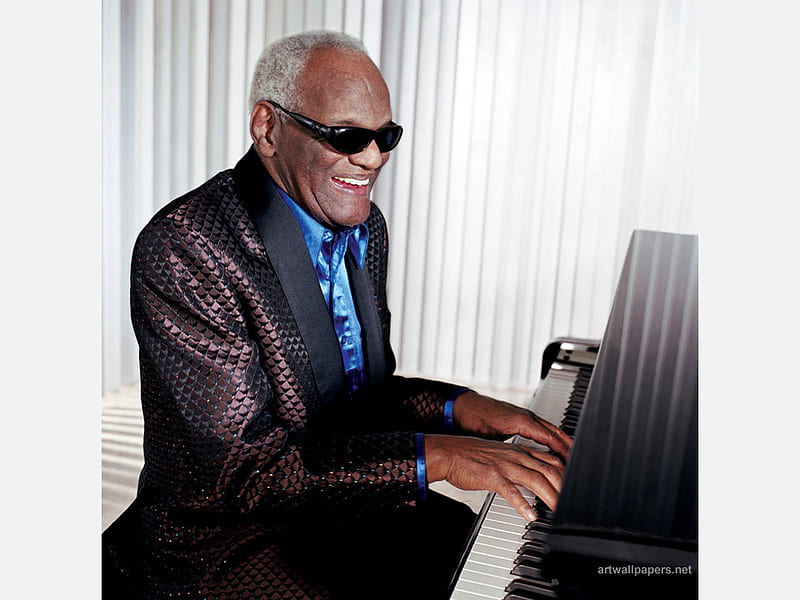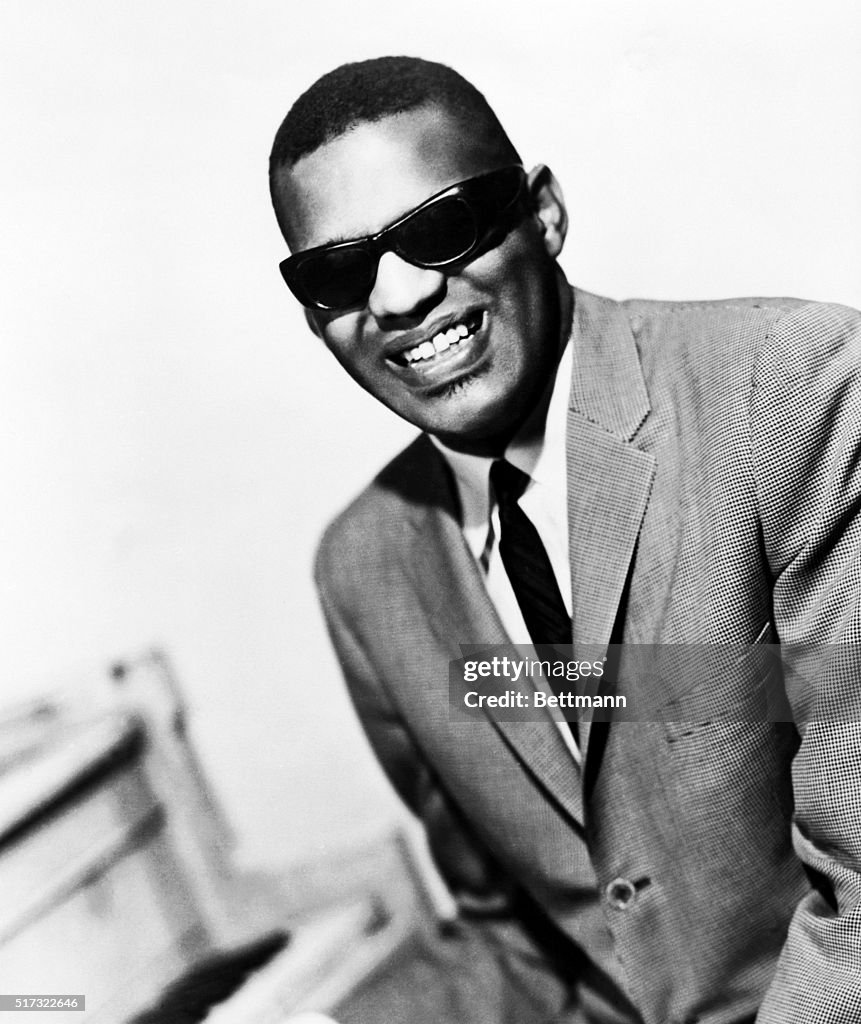Ray Charles: The Genius Of Soul - His Life & Music Legacy
Can a life defined by adversity truly become a symphony of triumph? Ray Charles's journey, from the shadows of blindness to the incandescent heights of musical genius, is a resounding affirmation.
The news, like a mournful chord, resonated across the globe on June 10, 2004: the world had lost Ray Charles. He passed away in his Beverly Hills home at the age of 73, succumbing to liver disease. His name, a beacon in the constellation of musical legends, remains etched in the collective memory. Charles, a singer, songwriter, pianist, and composer, was more than just a musician; he was a cultural force, a pioneer, and an inspiration.
The path to such eminence, however, was paved with challenges. Born Ray Charles Robinson on September 23, 1930, in Albany, Georgia, he faced hardships from a young age. By the age of six, glaucoma began its insidious march, stealing his sight. Two years later, at seven, he was completely blind. This devastating loss, however, became the crucible in which his talent was forged. It was in the darkness, paradoxically, that his inner world illuminated with an unparalleled brilliance.
| Category | Details |
|---|---|
| Full Name | Ray Charles Robinson |
| Born | September 23, 1930, Albany, Georgia, USA |
| Died | June 10, 2004, Beverly Hills, California, USA |
| Cause of Death | Liver Disease |
| Occupation | Singer, Songwriter, Pianist, Composer |
| Genres | Soul, Rhythm and Blues (R&B), Gospel, Jazz, Country, Pop |
| Instruments | Piano, Vocals |
| Known For | Pioneering Soul Music, Combining Genres, Iconic Hits |
| Notable Works | "I Can't Stop Loving You," "Georgia on My Mind," "Hit the Road Jack," "Unchain My Heart," "What'd I Say" |
| Awards and Recognition | 17 Grammy Awards, Grammy Lifetime Achievement Award, Kennedy Center Honors, National Medal of Arts |
| Official Website | Ray Charles Official Website |
Charles's musical journey began in the Jim Crow South, a period fraught with racial segregation and prejudice. The loss of his sight, coupled with the poverty and the tragic drowning of his younger brother, George, in a laundry tub when Ray was four, seemed to stack the odds against him. Yet, in the face of these adversities, his passion for music flourished. He had a passion for music since the age of three.
Music became his escape, his voice, and his vehicle for expression. He learned to play the piano at the age of five. It was in Seattle, Washington, in 1948, that Charles, then just 17, formed his first group, the McSon Trio. He began experimenting with different genres, blending blues, gospel, jazz, and country to create a sound that was uniquely his own.
Charles's early influences were rooted in the blues of Nat King Cole and Charles Brown. To avoid being confused with the popular boxer Sugar Ray Robinson, he adopted the name Ray Charles. He cut his first record, "Confession Blues," which marked the beginning of his recording career.
His musical innovations are legendary. He was a pioneer of soul music, merging the raw emotion of gospel with the rhythm and blues to create a sound that resonated with audiences across racial and social divides. Hits like "Unchain My Heart," "Hit the Road Jack," and "Georgia on My Mind" became anthems, weaving themselves into the fabric of American culture. "Georgia on My Mind" became the official state song of Georgia, a testament to the profound impact he had on his home state.
His music was not confined to a single genre. He fearlessly explored jazz, country, and even pop, demonstrating an incredible versatility and a deep understanding of musical forms. His 1962 UK and US No. 1 single, "I Can't Stop Loving You," showcased his ability to interpret and transform a song into a timeless classic. The 2005 US No. 1 album "Genius Loves Company" was another testament to his enduring appeal, featuring collaborations with a diverse range of artists.
Beyond his musical genius, Ray Charles was known for his resilience and his sharp wit. He refused to be defined by his blindness, always maintaining that it never hindered his career. He was a chess fiend, often playing late into the night. It was while he was in a rehabilitation program at St. Francis Hospital, near Los Angeles in 1965, that he learned to play chess. The game offered a strategic challenge and a social outlet, even in the midst of his struggles. He learned to pilot a plane at the age of seven.
He distanced himself from the stereotypes often associated with blind African American singers of the time. He even refused to play the guitar, stating, "Seems like every blind blues singer I'd heard about was playing a guitar." Charles carved his own path, forging a new identity, a new sound, and a new definition of what was possible.
Charles's impact extended beyond the realm of music. He became a symbol of perseverance, of overcoming adversity with grace and determination. He was, as he was often called, "The Genius." He earned the respect and admiration of his peers. He was a true original, and his influence continues to be felt in the music world today. His work paved the way for countless artists who followed in his footsteps.
His story is not just one of musical success; it is a testament to the human spirit. It is a story of resilience, creativity, and the unwavering pursuit of one's passion, even in the face of seemingly insurmountable obstacles. It is a story that continues to inspire generations. His legacy, like his music, is timeless, a reminder that even in the darkest of times, the light of genius can shine brilliantly.
Ray Charles's son, Ray Charles Robinson Jr., wrote in the 2010 biography, "You Don't Know Me: Reflections of My Father, Ray Charles," offering intimate glimpses into the man behind the music. These personal reflections add depth and nuance to the legend, reminding us that behind the genius was a human being with all the complexities, vulnerabilities, and triumphs that define us all.
The film "Ray," released in 2004, the same year of his death, offers a dramatized look at his life and career, further solidifying his status as a cultural icon. Jamie Foxx's Academy Award-winning portrayal captured the essence of Ray Charles, introducing his story to a new generation. The film further cemented his place in history, reinforcing his legacy as one of the most influential musicians of all time.
Charles's story is a powerful reminder that the challenges we face do not define us; it is how we respond to those challenges that truly matters. He embraced his talents, defied expectations, and left an enduring legacy that continues to inspire and uplift the world. His music continues to play, reminding us of the power of music to heal, to connect, and to transcend the boundaries of time and circumstance. Ray Charles was more than a musician; he was a visionary, a pioneer, and a testament to the indomitable human spirit.
His impact on popular music cannot be overstated. Ray Charles created recordings in a soulful style that changed the entire course of popular music in the late 1940s and early 1950s. His unique fusion of gospel, blues, and jazz, created a sound that was both deeply personal and universally appealing.
His ability to blend genres and connect with a diverse audience was truly remarkable. He had the ability to create his music with perfect pitch and an expressive voice. He remains, "The Genius," a musical titan whose contributions continue to shape the landscape of music today.


:max_bytes(150000):strip_icc()/GettyImages-569352057-5ae78ed4a9d4f90037898b2a.jpg)